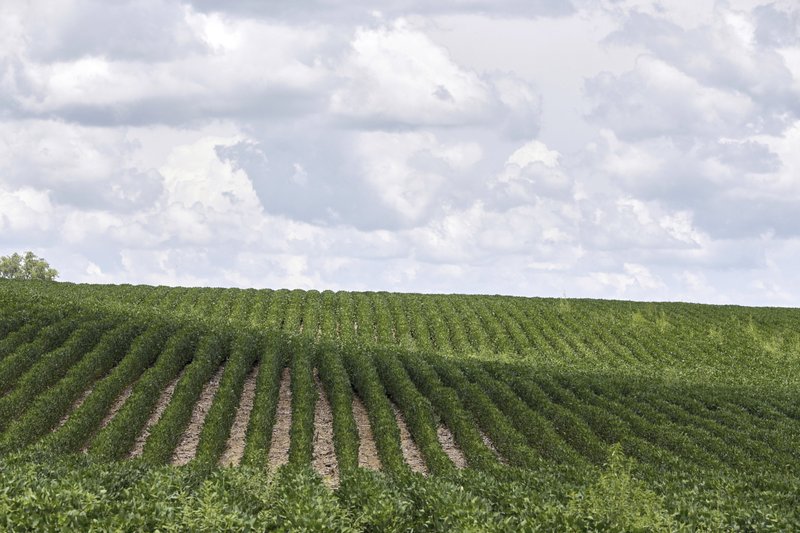GENEVA -- Human-caused climate change is dramatically degrading the Earth's land and the way people use the land is making global warming worse, a new United Nations scientific report says. That creates a vicious cycle that is already making food more expensive, scarcer and less nutritious.
"The cycle is accelerating," said NASA climate scientist Cynthia Rosenzweig, a co-author of the report. "The threat of climate change affecting people's food on their dinner table is increasing."
But if people change the way they eat, grow food and manage forests, it could help save the planet from a far warmer future, scientists said.
Earth's landmasses, which are only 30% of the globe, are warming twice as fast as the planet as a whole. While heat-trapping gases are causing problems in the atmosphere, the land has been less talked about as part of climate change. A special report, written by more than 100 scientists and unanimously approved by diplomats from nations around the world Thursday at a meeting in Geneva, proposed possible fixes and made more dire warnings.
"The way we use land is both part of the problem and also part of the solution," said Valerie Masson-Delmotte, a French climate scientist who co-chairs one of the panel's working groups. "Sustainable land management can help secure a future that is comfortable."
[Video not showing up above? Click here to watch » https://www.youtube.com/watch?v=8b9h0JDf3QA]
Scientists at Thursday's news conference emphasized both the seriousness of the problem and the need to make societal changes soon.
"We don't want a message of despair," said science panel official Jim Skea, a professor at Imperial College London. "We want to get across the message that every action makes a difference."
The report said climate change already has worsened land degradation, caused deserts to grow, permafrost to thaw and made forests more vulnerable to drought, fire, pests and disease. That's happened even as much of the globe has gotten greener because of extra carbon dioxide in the air. Climate change also has added to the forces that have reduced the number of species on Earth.
"The stability of food supply is projected to decrease as the magnitude and frequency of extreme weather events that disrupt food chains increases," the report said.
In the worst-case scenario, food security problems change from moderate to high risk with just a few more tenths of a degree of warming from now. They go from high to "very high" risk with just another 1.8 degrees Fahrenheit of warming from now.
"The potential risk of multi-breadbasket failure is increasing," NASA's Rosenzweig said. "Just to give examples, the crop yields were affected in Europe just in the last two weeks."
Scientists had long thought one of the few benefits of higher levels of carbon dioxide, the major heat-trapping gas, was that it made plants grow more and the world greener, Rosenzweig said. But numerous studies show that the high levels of carbon dioxide reduce protein and nutrients in many crops.
But better farming practices -- such as no-till agricultural and better targeted fertilizer applications -- have the potential to fight global warming, too, reducing carbon pollution up to 18% of current emissions levels by 2050, the report said.
If people change their diets, reducing red meat and increasing plant-based foods, such as fruits, vegetables and seeds, the world can save as much as another 15% of current emissions by midcentury. It would also make people more healthy, Rosenzweig said.
Reducing food waste can fight climate change even more. The report said that between 2010 and 2016, global food waste accounted for 8% to 10% of heat-trapping emissions.
Most scenarios predict the world's tropical regions will have "unprecedented climatic conditions by the mid-to-late 21st century," the report noted.
Agriculture and forestry together account for about 23% of the heat-trapping gases that are warming the Earth, slightly less than from cars, trucks, boats and planes. Add in transporting food, energy costs, packaging and that grows to 37%, the report said.
Saying "our current way of living and our economic system risks our future and the future of our children," Germany's environment minister, Svenja Schulze, questioned whether it makes sense for a country like Germany to import large amounts of soy from Latin America, where forests are being destroyed to plant the crop, to feed unsustainable numbers of livestock in Germany.
"We ought to recognize that we have profound limits on the amount of land available and we have to be careful about how we utilize it," said Stanford University environmental sciences chief Chris Field, who wasn't part of the report.
Information for this article was contributed by Frank Jordans of The Associated Press.
A Section on 08/09/2019
